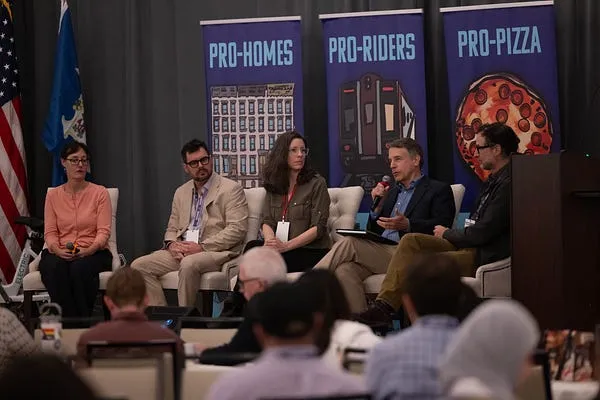Is YIMBYtown where Left & Right meet?

Dates to remember
- Mobility Speed Chats: digital networking event on Oct 7th. Sign up for a chance to win a free CoMotion LA Ticket.
- CoMotion is moderating panel ‘Belgium-California Dialogue on Smart & Sustainable Cities’ at the Smart & Resilient Cities Forum on Oct 9th at the Academy Museum of Motion Pictures in Los Angeles.
- CoMotion INNOVATORS Program application window closes on Oct 15th.
- CoMotion LA Salon at LA Tech Week: ‘The Future of Mobility UX’ on Oct 15th to discuss the future of the mobility experience and LA's unique opportunities. Co-hosted by CoMotion and BMW Designworks.
Welcome to CoMotion Deep Dive, a weekly examination of an issue or technology shaping the future of mobility. If this email was forwarded, you can sign up here.
It’s hard to imagine two groups as diametrically opposed as the League of Conservation Voters, the venerable environmental group, and Americans for Prosperity, the conservative advocacy group funded largely by Charles Koch and the late David Koch, the petrochemical magnates. And yet they’re both listed as sponsors of the YIMBYtown conference, where activists, academics and policymakers from around the U.S. gathered this week in New Haven, Conn. to attack America’s housing crisis.
YIMBY stands for “Yes In My Backyard,” the antithesis of NIMBY, “Not In My Backyard.” The YIMBY movement seeks to reduce regulatory barriers that either block or drive up the cost of housing, such as single-family zoning, minimum lot size requirements, parking mandates and height restrictions.

Despite the presence of some conservative groups, the “vibes” at YIMBYtown are overwhelmingly liberal. I can say with a great deal of confidence that Donald Trump had a very poor showing among the conference’s roughly 900 attendees. Climate change, racial equity and supporting public transit were common themes among the dozens of panels held over the three-day event. In the very first address of the conference, Redfin economist Daryl Fairweather noted glumly that it is particularly hard for people to find affordable housing in cities and states with strong LGBTQ protections.
But also present at the conference were elected officials and advocates who are indifferent or hostile to many of those same progressive causes. One panel, “Everything is Bigger in Texas: Crafting Coalitions for Transformative Housing Reform,” included an official from the ultraconservative, oil-backed Texas Public Policy Foundation and one from the progressive social justice group, Texas Appleseed, to discuss how they collaborated on recent bills forcing Texas cities to allow more multifamily housing.

“It’s really incredible to see some of the most far left groups and some of the most far right groups that on any other issue are on 100% opposing sides,” said Nicole Nosek, founder of Texans for Reasonable Solutions, which played a key role in coordinating the cross-ideological campaign for housing legislation in the Lone Star State.
The bills approved by Texas’s GOP-controlled legislature mirrored laws approved the previous year by the Democratic City Council of Austin, the liberal capital that is usually at odds with the state’s conservative leaders.
To get a sense on how the movement has evolved, I sat down with Sonja Trauss, widely regarded as one of the YIMBY movement’s pioneers. In 2011 Trauss was a teacher in San Francisco, frustrated by the city government’s hesitance to allow new apartments despite skyrocketing rents. In an effort to counter the power of homeowner groups that blocked new development, Trauss founded the cheekily-named Bay Area Renters Federation (BARF), which eventually broke off into several different groups, including YIMBY Action and its legal arm, YIMBY Law, which Trauss now heads.
Given the movement’s ideological diversity, I asked Trauss if she ever worries that some of the strident progressive rhetoric at the conference would alienate more conservative members of the movement, or vice versa.
“I actually don’t worry about alienating members of the coalition because we have a great track record,” she said. “It’s been 10 years and although there’s been disagreement, compared to other movements, we really haven’t torn each other apart. And I think it’s because, by definition, YIMBYs are incrementalists.”
In recent years, YIMBY bills have been passed by Republican legislatures in Montana, Texas, North Dakota as well as Democratic ones in Maine, Massachusetts, Hawaii, Washington state and Oregon. Just last week the California legislature adopted bipartisan legislation that will require local governments to allow midrise residential development within a half-mile of transit stations.
“Some movements are all people who share a goal and an ideology. And we’re not,” said Trauss. “We’re people who share a strategy. And that strategy is to build more housing where people want to live. And you might be here for the environmental reasons, because density is good for the environment. You might be here for anti-segregation. You might be here for migration – people should be able to move around. Or you might be here for economic growth. Or property rights.”
I didn’t quite understand. There’s not a goal? Isn’t housing the goal?
“You might think your goal is to buy a house,” she said. “But when you think about it, the goal isn’t to buy a house for its own sake. Your goal is to buy a house in a certain area. Your goal is ‘I want to live near my parents’ or I want to live in a place with good job prospects or I want to live in a place with a good school.”
Trauss herself recently relocated from Oakland to Berkeley in search of a more walkable neighborhood and streets where she feels comfortable letting her kids ride their bikes.
I note that there is clearly a lot of overlap between YIMBYs and advocates for urbanism, walkability and public transit. That’s true, she said, but she believes it’s important the two causes remain separate. That’s the message she sends to YIMBY Action’s more than 80 chapters around the country.
“We’re always telling them, don’t do mission creep,” she said. “Focus on housing.”
CoMotion's mobility goodness brought to you by:
Jack Craver,
Editor, CoMotion NEWS
jcraver@comotionglobal.com
Write to us if you would like to suggest content for more deep dives!

